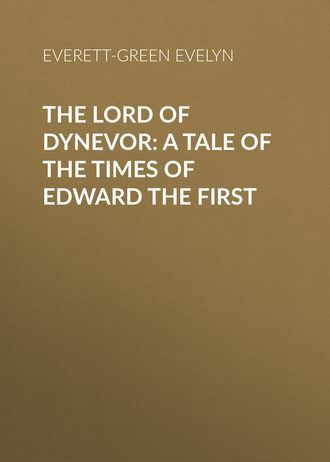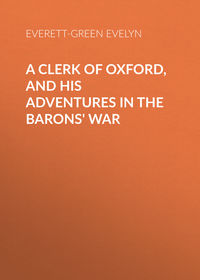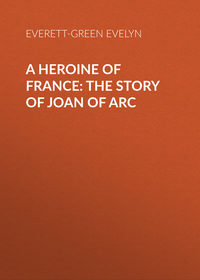 полная версия
полная версияThe Lord of Dynevor: A Tale of the Times of Edward the First
This last question was addressed to the servants who were at the lower end of the board, and one of them spoke up in reply. By what he said it appeared that Griffeth had started off early to fly a new falcon of his, and it seemed probable that his brothers and little Lady Gertrude had accompanied him; for whilst he had been discussing with the falconer the best place for making the proposed trial, Llewelyn had been to the stables and had saddled and led out the palfrey upon which their little guest habitually rode, and there seemed no reason to doubt that all the party had gone somewhere up upon the highlands to watch the maiden essay of the bird.
"She would be sure to long to see the trial," said Wendot, attacking the viands before him with a hearty appetite. "She always loves to go with us when there is anything to see or hear. I marvel that she spoke not of it to me, but perchance it slipped her memory."
The early risers were late at the meal, but no one was anxious about them. When anything so engrossing as the flying of a young falcon was in the wind, it was natural that so sublunary a matter as breakfast should be forgotten. The servants had finished their meal, and had left the table before there was any sign of the return of the wanderers, and then it was only Griffeth who came bounding in, his face flushed and his eyes shining as he caressed the hooded bird upon his wrist.
"He is a beauty, Wendot. I would thou hadst been there to see. I took him up to – "
"Ay, tell us all that when thou hast had something to eat," said Wendot. "And where is Gertrude? she must be well-nigh famished by this time."
"Gertrude? Nay, I know not. I have not seen her. I would not have wearied her with such a tramp through the heavy dews."
"But she had her palfrey; Llewelyn led it away ere it was well light. Were you not all together?"
"Nay, I was all alone. Llewelyn and Howel were off and away before I was ready; for when I sought them to ask if they would come, they were nowhere to be found. As for the maid, I never thought of her. Where can they have taken her so early?"
A sudden look of anxiety crossed Wendot's face; but he repressed any exclamation of dismay, and glanced at his mother to see if by any chance she shared his feeling. But her face was calm and placid, and she said composedly:
"If she is with Llewelyn and Howel she will be safe. They have taken her on some expedition in secret, but none will harm her with two such stout protectors as they."
And then the lady moved away to commence her round of household duties, which in those days was no sinecure; whilst Wendot stood in the midst of the great hall with a strange shadow upon his face. Griffeth, who was eagerly discussing his breakfast, looked wonderingly at him.
"Brother, what ails thee?" he said at length; "thou seemest ill at ease."
"I am ill at ease," answered Wendot, and with a quick glance round him to assure himself that there was no one by to hear, he approached Griffeth with hasty steps and sat down beside him, speaking in a low, rapid way and in English, "Griffeth, tell me, didst thou hear aught last night ere thou fell asleep?"
"Ay, I heard Wenwynwyn singing to his harp in his own chamber, but nought beside."
"I heard that too," said Wendot, "and for his singing I could not sleep; so when it ceased not, I rose and stole to his room to ask him to forbear, yet so wild and strange was the song he sang that at the door I paused to listen; and what thinkest thou was the burden that he sang?"
"Nay, I know not; tell me."
"He sang a strange song that I have never heard before, of how a dove was borne from safe shelter – a young dove in the absence of the father bird; not the mother bird, but the father – and carried away to the eagle's nest by two fierce young eaglets untamed and untamable, there to be left till the kites come down to carry off the prize.
"Ha! thou startest and changest colour! What is it thou fearest? Where are Llewelyn and Howell and what have they done with the maid? What kuowest thou, Griffeth?"
"I know nought," answered Griffeth, "save that Wenwynwyn has been up to the commot of Llanymddyvri, and thou knowest what all they of that place feel towards the English. Then Llewelyn and Howel have been talking of late of the eagle's nest on the crag halfway thither, and if they had named it to Gertrude she would have been wild to go and see it. We know when Wenwynwyn sings his songs how he ever calls Maelgon ap Caradoc the kite, and the lords of Dynevor the eagles. But, Wendot, it could not be – a child – a maid – and our father's guest. I cannot believe it of our own brothers."
"I know not what to think, but my heart misgives me. Thou knowest what Llewelyn ever was, and Howel is but his shadow. I have mistrusted this strange friendship before now, remembering what chanced that first day, and that Llewelyn never forgives or forgets; but I would not have dreamed of such a thing as this. Yet, Griffeth, if the thing is so, there is no time to lose. I am off for the crag this very minute. Thou must quietly collect and arm a few of our stanchest men, together with the English servants left here with their young mistress. Let all be done secretly and quietly, and come after me with all speed. It may be that we are on a fool's errand, and that our fears are groundless. But truly it may be that our brothers are about to betray our guest into the hands of one of England's most bitter foes.
"Oh, methinks were her father to return, and I had her not safe to deliver back to him, I would not for very shame live to see the day when I must avow to him what had befallen his child at the hands of my brethren!"
Griffeth was fully alive to the possible peril menacing the child, and eagerly took his orders from his elder brother. It would not be difficult to summon some dozen of the armed men on the place to accompany him quietly and secretly. They would follow upon Wendot's fleet steps with as little delay as might be, and would at least track the fugitive and her guides, whether they succeeded in effecting a rescue that day or not.
Wendot waited for nothing but to give a few directions to his brother. Scarce ten minutes had elapsed from the moment when the first illumination of mind had come to him respecting some plot against the life of an innocent child, before he had armed himself, and unleashed two of the fleetest, strongest, fiercest of the hounds, and was speeding up across the moor and fell towards the lonely crag of the eagle's nest, which lay halfway between the castle of Dynevor and the abode of Maelgon ap Caradoc.
There was one advantage Wendot possessed over his brothers, and that was that he could take the wild-deer tracks which led straight onward and upward, whilst they with their charge would have to keep to the winding mule track, which trebled the distance. The maiden's palfrey was none too clever or surefooted upon these rough hillsides, and their progress would be but slow.
Wendot moved as if he had wings to his feet, and although the hot summer sun began to beat down upon his head, and his breath came in deep, laboured gasps, he felt neither heat nor fatigue, but pressed as eagerly onwards and upwards as the strong, fleet hounds at his side.
He knew he was on the right track; for ever and anon his path would cross that which had been trodden by the feet of the boys and the horse earlier in the day, and his own quick eyes and the deep baying of the hounds told him at once whenever this was the case. Upwards and onwards, onwards and upwards, sprang the brave lad with the untiring energy of a strong and righteous purpose. He might be going to danger, he might be going to his death; for if he came into open collision with the wild and savage retainers of Maelgon, intent upon obtaining their prey, he knew that they would think little of stabbing him to the heart rather than be balked. There was no feud so far between Llanymddyvri and Dynevor, but Wendot knew that his father was suspected of leaning towards the English cause, and that it would take little to provoke some hostile demonstration on the part of his wild and reckless neighbour. The whole country was torn and rent by internecine strife, and there was a chronic state of semi-warfare kept up between half the nobles of the country against the other half.
But of personal danger Wendot thought nothing. His own honour and that of his father were at stake. If the little child left in their care were treacherously given up to the foes of the English, the boy felt that he should never lift up his head again. He must save her – he would. Far rather would he die in her defence than face her father with the story of the base treachery of his brothers.
The path grew wilder and steeper; the vegetation became more scant. The heat of the sun was tempered by the cold of the upper air. It was easier to climb, and the boy felt that his muscles were made of steel.
Suddenly a new sound struck upon his ear. It was like the whinny of a horse, only that there was in it a note of distress. Glancing sharply about him, Wendot saw Lady Gertrude's small white palfrey standing precariously on a ledge of rock, and looking pitifully about him, unable to move either up or down. The creature had plainly been turned loose and abandoned, and in trying to find his way home had stranded upon this ledge, and was frightened to move a step. Wendot was fond of all animals, and could not leave the pretty creature in such a predicament.
"Besides, Gertrude may want him again for the descent," he said; and although every moment was precious, he contrived to get the horse up the steep bank and on to better ground, and then tethered him on a small grassy plateau, where he could feed and take his ease in safety for an hour or two to come.
That matter accomplished, the lad was up and off again. He had now to trust to the hounds to direct him, for he did not know what track his brothers would have taken, and the hard rocks gave no indications which he could follow. But the dogs were well used to their work, and with their noses to the ground followed the trail unceasingly, indicating from time to time by a deep bay that they were absolutely certain of their direction.
High overhead loomed the apex of the great crag. Wendot knew that he had not much farther to go. He was able to distinguish the cairn of stones which he and his brothers had once erected on the top in honour of their having made the ascent in a marvellously short space of time. Wendot had beaten that record today, he knew; but his eyes were full of anxiety instead of triumph. He was scanning every track and every inch of distance for traces of the foe he felt certain were somewhere at hand. Had they been here already, and had they carried off the prey? Or were they only on their way, and had he come in time to thwart their purpose yet?
Ha! what was that?
Wendot had reached the shoulder of the mountain; he could see across the valley – could see the narrow winding track which led to the stronghold of Maelgon. The Eagle's Crag, as it was called, fell away precipitously on the other side. No one could scale it on that face. The path from the upper valley wound round circuitously towards it; and along this path, in the brilliant sunshine, Wendot saw distinctly the approach of a small band of armed men. Yes: they were approaching, they were not retreating. Then they had not already taken their prey; they were coming to claim it. The boy could have shouted aloud in his triumph and joy; but he held his peace, for who could tell what peril might not lie in the way?
The next moment he had scaled the steep, slippery rock which led to the precipitous edge of the crag. Not a sign could he see of his brothers or the child, but the hounds led right on to the very verge of the precipice, and for a moment the boy's heart stood still. What if they had grown afraid of the consequences of their own act, and had resolved to get rid of the child in a sure and safe fashion!
For a moment Wendot's blood ran cold. He recalled the traits of fierce cruelty which had sometimes shown themselves in Llewelyn from childhood, his well-known hatred of the English, his outburst of passion with Gertrude, so quickly followed by a strange appearance of friendship. Wendot knew his countrymen and his nation's characteristics, and knew that fierce acts of treachery were often truly charged upon them. What if – But the thought was too repellent to be seriously pursued, and shaking it off by an effort, he raised his voice and called his brothers by name.
And then, almost as it seemed from beneath his very feet, there came an answering call; but the voice was not that of his brothers, but the cry of a terrified child.
"Oh, who are you? Do, please, come to me. I am so frightened. I know I shall fall. I know I shall be killed. Do come to me quickly. I don't know where Llewelyn and Howel have gone."
"I am coming – I am Wendot," cried the boy, his heart giving a sudden bound. "You are not hurt, you are safe?"
"Yes; only so giddy and frightened, and the sun is so hot and burning, and yet it is cold, too. It is such a narrow place, and I cannot get up or down. I can't see the eagle's nest, and they have been such a long time going after it. They said they would bring the nest and the young eagles up to me, but they have never come back. I'm afraid they are killed or hurt. Oh, if you would only help me up, then we would go and look for them together! Oh, I am so glad that you have come!"
Wendot could not see the child, though every word she spoke was distinctly audible. He certainly could not reach her from the place where he now stood; but the hounds had been following the tracks of the quarry they had been scenting all this way, and stood baying at a certain spot some fifty yards away, and a little lower down than the apex of the crag. It was long since Wendot had visited this spot, his brothers knew it better than he; but when he got to the place indicated by the dogs, he saw that there was a little precipitous path along the face of the cliff, which, although very narrow and not a little dangerous, did give foothold to an experienced mountaineer. How the child had ever had the nerve to tread it he could not imagine, but undoubtedly she was there, and he must get her back, if possible, and down the mountainside, before those armed men from the upper valley could reach them.
But could he do this? He cast an apprehensive glance over his shoulder, and saw to his dismay how quickly they were approaching. From their quickened pace he fancied that his own movements had been observed. Certainly there was not a moment to lose, and leaving the dogs to keep guard at the entrance, he set his foot upon the perilous path and carefully pursued his way.
The face of the cliff jutted outwards for some yards, and then made a sharp turn round an angle. At the spot where this turn occurred, a sort of natural arch had formed itself over the narrow ledge which formed the path, and immediately behind the arch there was a small plateau which gave space to stand and move with some freedom, although a step over the edge would plunge the unwary victim into the deep gulf beneath. The cliff then fell away once again, but the ledge wound round it still, until it ended in a shallow alcove some eight feet deep, which lay just beneath the highest part of the crag, which overhung it by many yards.
And it was crouched up against the cliff in this little alcove that Wendot found Gertrude; cowering, white-faced, against the hard rock, faint from want of food, terrified at the loneliness and at her own fears for the safety of her companions, and so overwrought by the tension of nerve she had undergone, that when Wendot did stand beside her she could only cling to him sobbing passionately, and it was long before he could even induce her to let him go, or to attempt to eat the contents of a small package he had had the forethought to bring in his wallet.
He heard her tale as she sobbed in his arms. They had come here after the eagle's nest. Llewelyn and Howel had been so kind! They had not minded her being so slow, but had brought her all the way; and when she wanted to follow them along the ledge to get a better view of the nest, they had blindfolded her that she might not get giddy, and had put a rope round her and brought her safely along the narrow ledge till she had got to this place. But the nest could not be seen even from there, and they had left her to see where it really was. They said they would soon be back, but they had not come, and she had got first anxious and then terrified about them, and then fearful for her own safety. At last when faintness and giddiness had come upon her, and she could get no answer to her repeated shouts, her spirit had altogether given way; and unless Wendot had really come to her rescue, she was certain she should have fallen down the precipice. She did not know now how she should ever get back along the narrow ridge, she was so frightened and giddy. But if Llewelyn and Howel would come, perhaps she might.
Did Wendot know where they were? Would he take care of her now, and bring her safe home?
"I will if I can," answered the boy, with a strange light in his blue eyes. "Griffeth is on his way with plenty of help. He will be here soon. Do you think you could walk along the ridge now, if I were to hold you up and help you? We should get home sooner if you could."
But the child shrank back and put her hand before her eyes.
"Oh, let us wait till Griffeth comes. I am so giddy still, and I am so afraid I should fall. Hark! I'm sure I hear voices. They are coming already. Oh, I am so glad! I do want to get home. Wendot, why do you look like that? Why do you get out that thing? You are not going to fight?"
"Lady Gertrude," said Wendot, speaking in a grave, manly way that at once riveted the child's attention, "I am afraid that those voices do not belong to our friends, but to a band of men who are coming to try and take you prisoner to a castle up the valley there. No: do not be frightened; I will save you from them if I can. There is help coming for us, and I think I can hold this path against them for some time to come. You must try and keep up heart and not be frightened. You may see some hard blows struck, but you can shut your eyes and not think about it. If they do kill me and carry you off, do not give up hope, for Griffeth and our own men will be after you to rescue you. Now let me go, and try not to be afraid. I think we can hold them at bay till we are more equally matched."
The child's eyes dilated with horror. She caught Wendot by the hand.
"Give me up," she said firmly. "I will not have you killed for me. I would rather go with them. Give me up, I say!"
"No, Gertrude; I will not give you up," answered Wendot very quietly, but with an inflexibility of tone which made his voice seem like that of another person. "Your father placed you in my hands; to him I must answer for your safety. What is life to a man without honour? Would you have me stain my name for the sake of saving my life? I think not that that is the English code of honour."
Child as she was, little Gertrude understood well what was implied in those words, and a new light flashed into her eyes. Something of the soldier spirit awoke within her, and she snatched at a small dagger Wendot carried in his belt, and drawing her small figure to its full height, she said:
"We will both fight, Wendot; we will both fight, and both die rather than let them take us."
He smiled, and just for a moment laid his hand upon her head; then he drew on his mailed gloves and looked well to the buckles of the stout leathern jerkin, almost as impervious to the stabs of his foes as a suit of mail itself. The temper of his weapon he well knew; he had no fear that it would play him false. He had not the headpiece of mail; he had started in too great a hurry to arm himself completely, and speed was too much an object for him to willingly encumber himself needlessly. But as he skirted the narrow ledge, and placed himself beneath the protecting arch, he smiled grimly to himself, and thought that the stone would be as good a guard, and that here was a place where a man could sell his life dear, and send many a foe to his account before striking his own colours.
Scarcely had he well established himself in the commanding position he had resolved upon, when the sound of voices became more distinct. The party had plainly arrived at the appointed place, and Wendot could hear them discussing who was best fitted for the task of traversing the dangerous ledge to bring back the captive who was to be found there. The wild Welsh was unintelligible to Gertrude, or she would have known at once what dark treachery had been planned and carried out by her trusted companions; but Wendot's cheek glowed with shame, and he set his teeth hard, resolved to redeem the honour of his father's name to the last drop of his blood if he should be called upon to shed it in the cause.
He heard the slow and cautious steps approaching along the path, and he gripped his weapon more tightly in his hand. The red light of battle was in his eyes, and the moment he caught sight of the form of the stalwart soldier threading his perilous way along the path he sprang upon him with a cry of fury, and hurled him into the gulf beneath.
Down fell the man, utterly unprepared for such an attack, and his sharp cry of terror was echoed from above by a dozen loud voices.
Cries and shouts and questions assailed Wendot, but he answered never a word. Those above knew not if it had been an accident, or if an ambushed foe had hurled their comrade to destruction. Again came a long pause for consideration – and every moment wasted was all in favour of the pair upon the ledge – and then it became plain that some course of action had been determined upon, and Wendot heard the cautious approach of another foe. This man crept on his way much more cautiously, and the youth held himself ready for a yet more determined spring. Luckily for him, he could remain hidden until his opponent was close to him; and so soon as he was certain from the sound that the man was reaching the angle of the rock, he made another dash, and brought down his sword with all the strength of his arm upon the head of the assailant.
Once again into the heart of the abyss crashed the body of the unfortunate soldier; but a sharp thrill of pain ran through Wendot's frame, and a barbed arrow, well aimed at the joint of his leather jerkin, plunged into his neck and stuck fast.
The first assailant whom he had disposed of was but one of a close line, following each other in rapid succession. As his face became visible to the man now foremost a shout of surprise and anger rose up.
"It is Res Wendot! It is one of the sons of the house of Dynevor!
"Wendot, thou art mad! We are the friends of thy house. We are here at the instigation of thine own kindred. Give us the maid, and thou shalt go free. We would not harm thee."
"Stir but one step nearer, and I slay thee as I have slain thy two comrades," cried Wendot, in a voice which all might hear. "I deal not in treachery towards those that trust us. I will answer for the safety of the maid with mine own life. Of my hand her father will demand her when he comes again. Shall we men of Wales give right cause to the English to call us murderers, traitors, cowards? Take my life if you will, take it a thousand times over if you will, it is only over my dead body that you will reach that child."
"Down with him – traitor to the cause! He is sold to the English! He is no countryman of ours! Spare him not! He is worthy of death! Down with every Welshman who bands not with those who would uphold his country's cause!"
Such were the shouts which rent the air as the meaning of Wendot's words made itself understood. As for the brave lad himself, he had plucked the arrow from his neck, and now stood boldly on guard, resolved to husband his strength and keep on the defensive only, hoping thus to gain time until Griffeth and the armed men should arrive.
He had all the advantage of the position; but his foes were strong men, and came on thick and fast one after another, till it seemed as if the lad might be forced backwards by sheer weight and pressure. But Wendot was no novice at the use of arms: as his third foe fell upon him with heavy blows of his weighted axe, he stepped backwards a pace, and let the blows descend harmlessly upon the solid rock of the arch; until the man, disgusted at the non-success of his endeavours to tempt his adversary out of his defended position, threw away his blunted axe, and was about to draw his sword for a thrust, when the boy sprang like lightning upon him, and buried his poniard in his heart.









